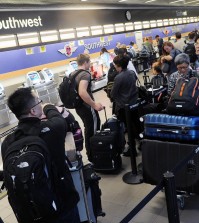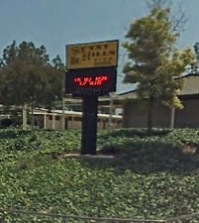- California Assembly OKs highest minimum wage in nation
- S. Korea unveils first graphic cigarette warnings
- US joins with South Korea, Japan in bid to deter North Korea
- LPGA golfer Chun In-gee finally back in action
- S. Korea won’t be top seed in final World Cup qualification round
- US men’s soccer misses 2nd straight Olympics
- US back on track in qualifying with 4-0 win over Guatemala
- High-intensity workout injuries spawn cottage industry
- CDC expands range of Zika mosquitoes into parts of Northeast
- Who knew? ‘The Walking Dead’ is helping families connect
S. Korea man arrested over alleged online death threat on US envoy

In this March 10, 2015, injured U.S. Ambassador to South Korea Mark Lippert leaves after being discharged from Seoul’s Severance Hospital in Seoul, South Korea. South Korean police said Friday that they had arrested a 33-year-old jobless man for allegedly making an online threat to kill the U.S. ambassador in Seoul. The man allegedly left an English message vowing to “kill” Mark Lippert with “nuclear poisoning” on the website of the White House on July 8, police said in a statement. (AP Photo/Lee Jin-man)
SEOUL, South Korea (AP) — South Korean police said Friday that they had arrested a 33-year-old jobless man for allegedly making an online threat to kill the U.S. ambassador in Seoul.
The man allegedly left an English-language message vowing to kill Mark Lippert with “nuclear poisoning” on the White House website on July 8, police said in a statement.
The man, surnamed Lee, has denied the allegation. But police say they’ve found a draft of the online threat and records of access to the White House homepage on his laptop computer, according to the statement.
The allegations come just months after Lippert was attacked by another man who slashed him with a knife during a breakfast forum. Lippert suffered deep gashes on his face and arm in that attack in March and was treated at a Seoul hospital for five days.
Police said the message, which contained many grammar errors, didn’t clearly explain why he wanted to kill Lippert. They refused to disclose the full message.
Police said the man has lived in seclusion at his home but there is no record of any psychiatric hospital treatment. The investigation began at the request of the U.S. Embassy in Seoul, according to the police statement.
If convicted, the man could face up to five years in prison.
The man who attacked Lippert in March was later charged with attempted murder. Police said he chose Lippert as a target to highlight his opposition to U.S.-South Korean military drills, which North Korea calls an invasion rehearsal. Seoul and Washington have said their drills are purely defensive.
Anti-U.S. activists have long blamed the presence of 28,500 U.S. troops stationed in South Korea for the continuing split of the Korean Peninsula.
















